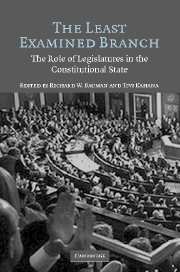Book contents
- Frontmatter
- Contents
- Foreword: Legislatures in the Constitutional State by Amy Gutmann
- Contributors
- New Ways of Looking at Old Institutions
- PART ONE LEGISLATURES AND DEMOCRATIC THEORY
- PART TWO LEGISLATING AND DELIBERATING IN THE DEMOCRATIC LEGISLATURE
- PART THREE CONSTITUTION MAKING BY LEGISLATURES: THE EXPLICIT VERSION
- PART FOUR CONSTITUTION MAKING BY LEGISLATURES: THE IMPLICIT VERSION
- PART FIVE CONSTITUTIONAL INTERPRETATION AND APPLICATION BY THE LEGISLATURE
- PART SIX IS LEGISLATIVE CONSTITUTIONALISM POSSIBLE?
- PART SEVEN THE LEGISLATURE IN DIALOGUE: DOMESTIC AND INTERNATIONAL CONTEXTS
- 25 Disobeying Parliament? Privative Clauses and the Rule of Law
- 26 Look Who's Talking Now: Dialogue Theory and the Return to Democracy
- 27 An International Community of Legislatures?
- 28 Legislatures in Dialogue with One Another: Dissent, Decisions, and the Global Polity
- Index
26 - Look Who's Talking Now: Dialogue Theory and the Return to Democracy
Published online by Cambridge University Press: 06 August 2009
- Frontmatter
- Contents
- Foreword: Legislatures in the Constitutional State by Amy Gutmann
- Contributors
- New Ways of Looking at Old Institutions
- PART ONE LEGISLATURES AND DEMOCRATIC THEORY
- PART TWO LEGISLATING AND DELIBERATING IN THE DEMOCRATIC LEGISLATURE
- PART THREE CONSTITUTION MAKING BY LEGISLATURES: THE EXPLICIT VERSION
- PART FOUR CONSTITUTION MAKING BY LEGISLATURES: THE IMPLICIT VERSION
- PART FIVE CONSTITUTIONAL INTERPRETATION AND APPLICATION BY THE LEGISLATURE
- PART SIX IS LEGISLATIVE CONSTITUTIONALISM POSSIBLE?
- PART SEVEN THE LEGISLATURE IN DIALOGUE: DOMESTIC AND INTERNATIONAL CONTEXTS
- 25 Disobeying Parliament? Privative Clauses and the Rule of Law
- 26 Look Who's Talking Now: Dialogue Theory and the Return to Democracy
- 27 An International Community of Legislatures?
- 28 Legislatures in Dialogue with One Another: Dissent, Decisions, and the Global Polity
- Index
Summary
What is the constitutional role of legislatures in a liberal democratic state? Authors in this volume provide a range of answers. Some depict legislatures as objects of constitutional decision making; for them, the primary role of legislatures is to be directed by constitutional norms. Others represent legislatures as instruments of constitutional decision making; for them, legislatures play a significant role in fulfilling constitutional norms. Still others characterize legislatures as sources of constitutional decision making; for them, legislatures play a key role in the generation of constitutional norms.
Canadian adherents of “dialogue theory” go further. They portray legislatures as playing a crucial role in legitimizing constitutional norms, including norms articulated through judicial decision making. Advanced by leading constitutional scholars and embraced by the Supreme Court of Canada, this theory holds that the purpose of judicial review under the Canadian Charter of Rights and Freedoms is to augment democratic decision making. Dialogue theorists maintain that judicial decisions under the Charter are not conclusive but form part of a dialogue with legislatures in which the latter retain the final say. It is this capacity of legislatures to decide the outcome of Charter issues that, in the eyes of dialogue theorists, bestows democratic legitimacy on Charter decision making.
The notion that the legitimacy of constitutional decision making rests on the ability of legislatures to trump judicial decisions is replete with contradictions and ironies, and raises questions that have both promising and troubling dimensions.
- Type
- Chapter
- Information
- The Least Examined BranchThe Role of Legislatures in the Constitutional State, pp. 519 - 531Publisher: Cambridge University PressPrint publication year: 2006
- 3
- Cited by



